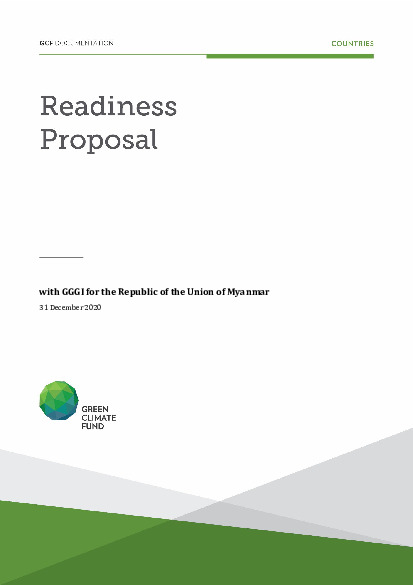Support for National Low Emission and Climate Resilient Development in Myanmar

Support for National Low Emission and Climate Resilient Development in Myanmar
The COVID-19 pandemic is creating a crisis in Myanmar’s rural and urban areas, hampering progress in the new planting season as well as progress on construction sites and factories around the country. A recent survey conducted by UN-Habitat in Yangon highlights that at least one person per household among urban-poor households in the city has lost their income. Supply chains have been disrupted and the prices of natural resources are plummeting. These challenges highlight the need for the identification of green recovery options for Myanmar, in connection with the supply of sustainable infrastructure, and for the development of sustainable value chains. For example, investments in renewable infrastructure offer a greater return given the current low price of oil, while the development of green value chains can serve to provide new jobs that are not dependent on international investment.
In parallel, Myanmar is in the process of revising its NDC (Nationally Determined Contributions), and launching its NUP (National Urban Policy), with the former highlighting key urban sectors such as industrial buildings, transport and waste as key sectors for focusing emission reductions, and the latter highlighting the necessity for coherent multi-level governance frameworks that are able to position cities as leaders in the fight against climate change.
Myanmar’s COVID Economic Recovery Plan (CERP) already calls for the fast tracking of certain infrastructure investments, including expediting renewable energy projects, as one of its top priorities, the governance framework for maintaining a sustainable and resilient development pathway during the recovery period requires additional support that responds to COVID-19.
The proposed project aims to contribute to addressing some of the key challenges including:
- A lack of long-term mechanisms supporting and integrating green economic growth policies and guidelines between central and sub-national governments; the lack of a national LT-LEDS (Long Term Low Emissions Development Strategies) process thus far in Myanmar.
- Inconsistent datasets for meeting NDC targets, a lack of socio-economic sectoral policies for COVID-19 green recovery on the scale of Myanmar’s state and regional governments and cities.
- The potential derailing of future subnational low carbon and climate resilient growth pathways due to the economic crisis linked to COVID-19 due to the call for ramped up investment.
- Insufficient understanding and shared policy actions between government departments working on low carbon urban growth, and the overall lack of a clear “whole government” framework that responds to this.
- The persistent lack of a roadmap that supports local action in the implementation of national and international policy (NDC, National Adaptation Plan, LEDS, The Myanmar Sustainable Development Plan MSDP]).